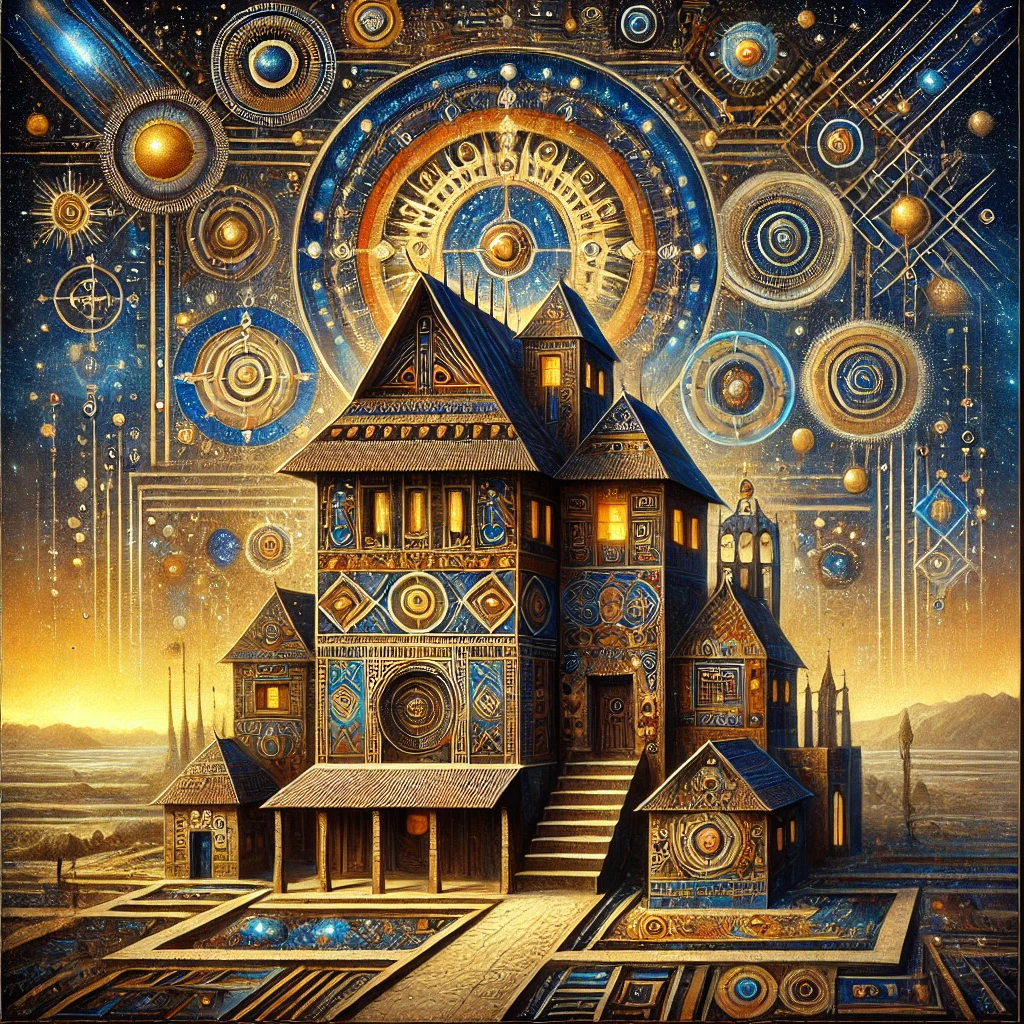Dogon Cosmology

Place of Origin: West Africa (modern-day Mali and Burkina Faso)
Century of Origin: Ancient Era (Unknown Exact Date)
Overview of Dogon Cosmology
Dogon Cosmology is the philosophical and spiritual worldview of the Dogon people, an ethnic group in West Africa, primarily in Mali. It explores the origins of the universe, the connection between humans and the divine, and the sacred patterns of life. The Dogon have a rich oral tradition, and their cosmology incorporates detailed astronomical knowledge, myths, and rituals that guide their understanding of existence and their place within the cosmos.
Dogon metaphysics describes the universe as a dynamic interplay between spiritual and physical realms. At the centre of their cosmology is Amma, the supreme creator god, who brought the universe into existence. The creation story involves the Nommo, amphibious beings who are seen as the first creations of Amma and bringers of order and knowledge. The universe is seen as interconnected, with patterns and cycles that reflect the balance between chaos and harmony.
Knowledge in Dogon Cosmology is rooted in oral traditions, myths, and observation of the natural world. The Dogon are known for their advanced understanding of astronomy, including knowledge of the Sirius star system, which they describe in detail despite its being invisible to the naked eye. This knowledge is transmitted through initiation rituals, storytelling, and art.
Ethics in Dogon Cosmology emphasise living in harmony with nature and respecting the divine order. Humans are seen as part of a larger cosmic balance, and actions that disrupt this balance are considered unethical. Community rituals, farming practices, and social relationships are all guided by principles of respect, reciprocity, and gratitude.
Dogon logic is centred on symbolic understanding and recognising the patterns in life and the cosmos. Symbols and myths are used to explain complex ideas, such as the creation of the universe and the interconnectedness of all things. The Dogon use reasoning to interpret these symbols, seeing them as keys to unlocking deeper truths about existence.
Art and symbolism are central to Dogon Cosmology. Their masks, sculptures, and architecture are not merely decorative but convey spiritual meanings and represent cosmic concepts. For example, their ceremonies often involve intricate dances with masks that symbolise celestial bodies, animals, and deities. These expressions celebrate the beauty and harmony of the universe.
The Dogon approach philosophy through a combination of oral tradition, ritual practice, and symbolic representation. Knowledge is passed down through generations by elders and initiated members of the community. Their methodology blends observation, spiritual insight, and storytelling to explore profound questions about existence and the cosmos.
In Dogon Cosmology, humans are seen as integral to the universe’s balance. They are connected to both the earth and the divine, with responsibilities to maintain harmony through their actions. The Dogon creation myth describes humans as part of a sacred cycle, with each individual contributing to the greater cosmic order through their life and deeds.
Dogon political philosophy emphasises the role of leaders as stewards of balance and harmony. Community decisions are often guided by spiritual principles, and rituals are performed to seek divine guidance. Leadership is seen as a responsibility that involves upholding ethical practices and ensuring the well-being of the community.
Dogon Cosmology has been preserved through centuries of oral tradition and rituals. Their astronomical knowledge and creation myths have fascinated scholars worldwide, particularly after being documented by French anthropologists Marcel Griaule and Germaine Dieterlen in the mid-20th century. Despite external influences, the Dogon people have maintained their rich philosophical and cultural heritage.
Key themes in Dogon Cosmology include creation, the interplay of chaos and order, the interconnectedness of all life, and the importance of maintaining harmony. Their philosophy also explores the relationship between humans and the divine, using symbolism and rituals to convey profound truths.
Dogon Cosmology is not attributed to individual philosophers but to the collective wisdom of their elders, priests, and storytellers. These figures play a vital role in preserving and transmitting their philosophical and spiritual teachings through rituals, myths, and symbols.



